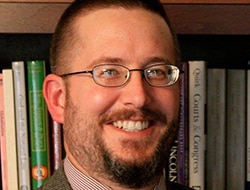
“It was just as good the first time as it was the second,” our 17-year-old, Rose, said tonight at dinner, trying to convince Stephen, who turned 21 yesterday, to watch the movie “Knives Out.” It took about a half a beat before we all began to laugh, as Rose’s inversion of a fairly common statement of praise — “It was just as good the second time as it was the first” — sank in.
We sometimes praise movies by saying that they get better with each viewing, but mostly we complain that films or TV shows or books “haven’t aged well.” We’ve all had the experience of trying to recreate what we recall as the perfect dinner at our favorite restaurant only to push the plate away, disappointed, because what the waiter has set before us now does not live up to what we remember it being then.
Time heals all wounds, they say, in part because our memories fade just enough to sand off all the rough edges and mellow all of the bitter notes. A perfect memory might seem like a blessing, but as someone who, well into his 40’s, could recall lengthy conversations word for word (and played them back constantly in his head), I can testify that it’s more often a curse. (Time has healed that wound as well, and one of the reasons I preferred to walk to work, when I still went to work, was so I didn’t have to remember where I put my car keys.)
But Rose’s humorous inversion struck me as particularly appropriate as most of America continues to shelter in place, and an increasing number of people — even those who have been able to work from home — cannot wait to return to something closer to the life that was. Early on, we tried to find the silver lining in the cloud, and most of us did a pretty good job of it. We were spending more time with our families, we were baking bread and learning new recipes, we were avoiding fast food and helping out local restaurants by ordering takeout, we were learning new skills and spending less time in meetings and getting our work done in record time. (Or, as is the case with our Content Team here at OSV, turning out considerably more content in the same amount of time.)
Americans, though, are a fickle people. We like change. We prefer the new to the tried and true. And now that we’re sheltering at home and working remotely, everything old is new again.
But as Christians, we’re pilgrims in this world. Our progress — in the original sense of the word, as movement — is toward something better, toward a life everlasting, without bitterness and pain. We are oriented — directed — toward our end. “In my beginning is my end,” wrote T.S. Eliot at the beginning of “East Coker,” the second of the poems that makes up his Four Quartets. And “In my end is my beginning,” he wrote at the very end of the same poem.
When we find something that is good, and true, and beautiful, it should be just as good the first time as it is the second — and the third, and every time beyond. That something holds up over time means that it partakes of the timeless, and we enter into a timeless moment when we lose ourselves in it. On the surface, history seems to be all about change, but at its core, as Eliot wrote in “Little Gidding,” the fourth of the Four Quartets, “history is a pattern / Of timeless moments.”
Whether “Knives Out” deserves the particular praise that Rose unintentionally gave it is not for me to say. But she hit upon something essential to our humanity. Our restlessness, our desire for the new, our inability to stop and to appreciate the good that lies before us, and to see how it partakes of the timelessness of the one who is goodness and truth and beauty in its fullness — all of this keeps us away from those timeless moments where God himself is found.
Scott P. Richert is publisher for OSV.





